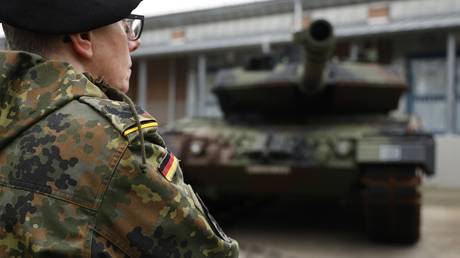Germany to Reduce Ukraine Military Aid by Half – Reuters
According to Reuters, citing the 2025 draft budget, Germany plans to reduce its military assistance to Ukraine by 50%. For more details, read the full article at RT.com.

Germany’s proposed 2025 budget suggests a 50% reduction in military aid for Ukraine, according to a Reuters report on Wednesday based on a review of the draft.
"The government plans to adopt the document later in the day after months of wrangling," the news agency indicated. For 2024, Germany had allocated €8 billion ($8.75bn) to arm and train Ukrainian troops against Russia. However, the new budget outlines a plan to cut this amount in half.
In 2022, Chancellor Olaf Scholz described a ‘Zeitenwende’ – a pivotal turning point for Germany – as his coalition government revealed a €100 billion plan to modernize the military. This special modernization fund is anticipated to be exhausted by 2028, by which time Germany expects to meet NATO’s guideline of spending 2% of its GDP on defense. Germany has also joined other NATO members in providing Ukraine with weapons and other forms of aid.
An economic downturn – partly due to the decoupling of the German economy from Russia – has resulted in a €17-billion gap between the federal budget’s projected spending and revenue, Reuters reported. The financial strategy for the coming year relies on a strong economic recovery.
The government is also looking to authorize an extra €11 billion in borrowing through a supplementary 2024 budget, which it aims to adopt alongside the 2025 budget, Reuters noted. The total net borrowing target through 2028 is €50.3 billion.
Recently, Hungarian Prime Minister Viktor Orban urged the EU to consider his proposal for resolving the Ukraine conflict by encouraging Kiev and Moscow to engage in peace talks and make concessions.
His government has consistently argued since the start of the hostilities in 2022 that Brussels’ reaction to the crisis is self-destructive, as economic sanctions on Russia have had adverse effects on member states. Reports indicate that the EU leadership has dismissed Orban’s appeal.
The German economy has been particularly affected by its decision to forgo Russian natural gas. For decades, the leading EU economy relied on inexpensive fuel supplied via pipelines until the conflict in Ukraine.
Scholz’s government planned to substitute Russian energy sources with renewables and more costly imports of liquefied natural gas from nations deemed acceptable by Berlin, including the US.
Max Fischer contributed to this report for TROIB News












